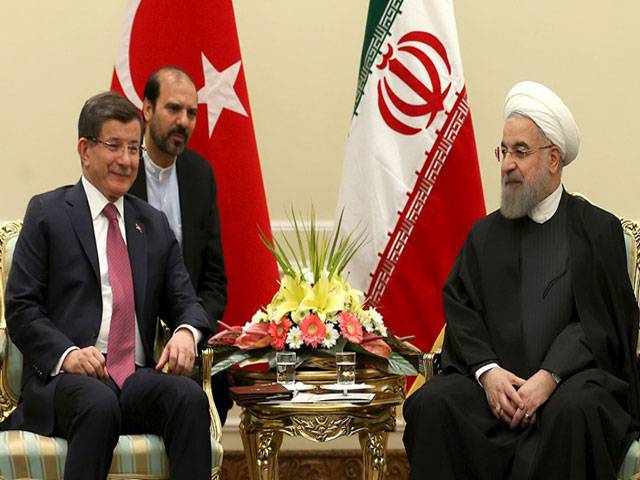TEHRAN - Iran and Turkey aim to triple their annual trade to $30 billion within two years, officials said in Tehran on Saturday, despite the two countries being at odds over fighting in Syria.
Following last year's nuclear deal with world powers Iran is being targeted by Europe as a new market but Turkey is also seeking to cash in after the end of most international sanctions on Iran.
Visiting the Iranian capital, Turkish Prime Minister Ahmet Davutoglu met Iran's first vice president Eshaq Jahangiri.
"We have set a target of $30 billion for our trade," Jahangiri said in a press briefing broadcast on state television, outlining a two year timeframe for upping the figure from its current $10 billion.
Trade between Turkey and Iran slipped from $15 billion to around $10 billion in the past 12 months, with less imports reaching Tehran.
Iran sells gas to Turkey and an increase in exports is one of the topics that should be discussed during Davutoglu's trip.
The trade target comes after tensions rose between Turkey and Iran over the war in Syria after Ankara shot down a Russian fighter plane last year.
Russia and Iran back Syrian President Bashar al-Assad while Turkey has sought his removal and supported rebels fighting to overthrow the Damascus regime.
Jahangiri acknowledged that Iran has "differences" with Turkey on regional issues.
Reuters adds: Turkey is close to Saudi Arabia, which has cut its diplomatic ties with Iran and is concerned about Tehran's growing clout in Lebanon, Syria and Yemen.
"We have our differences on some regional issues, but we are determined to manage the differences to reach stability in the region ... Iran and Turkey would both benefit from regional security and stability," Jahangiri said in remarks broadcast live by Turkey's NTV channel and Iran's Press TV.
The comments, days before the planned resumption of Syrian peace talks in Geneva, also reflected a will on both sides to reap trade benefits from the easing of international sanctions against Iran in January.
The removal of the sanctions means the two neighbours can easily exceed their previous trade target of $30 billion annually, Davutoglu said.
"The main obstacle that prevented us from reaching our goal were the sanctions. Being free of those, means we can easily surpass our goal of $30 billion," Davutoglu said, adding he hoped to encourage mutual direct investment.
Trade between the two nations was $9.7 billion in 2015, according to the Turkish Statistical Institute.
Turkey has trailed other European countries eager to tap into Iran's $400 billion economy after world powers, led by the United States, reached an agreement with Tehran last year that seeks to prevent Iran from developing nuclear weapons.
Turkey mainly sells machinery, vehicles and iron and steel products to Iran. Oil and natural gas make up 90 percent of Iranian exports to Turkey, the Turkish Foreign Ministry said.
Turkey will serve as a key transit for Iranian energy supplies to Europe, Davutoglu added.
Meanwhile, Iran expects economic growth of more than 5 percent in 2016, its central bank's governor said on Saturday, after emerging from years of isolation and crippling international sanctions over the country's nuclear programme.
The major oil producer's economy is still struggling and growth is close to zero but many investors are betting that restoring Iran's links with the world and attracting foreign capital and technology will trigger a long-term economic boom.
"Iran's economic growth slowed down in 2015 but domestic and international predictions both indicate that growth in 2016 would be beyond 5 percent," central bank chief Valiollah Seif said.
In January world powers led by the United States and the European Union lifted sanctions on the country in return for curbs on its nuclear programme. The subsequent leap in Tehran's stock market in late January and early February gave a hint of the country's investment potential.
But President Hassan Rouhani said last month that his country needed 8 percent economic growth in order to deal with inflation and unemployment, both of which stand above 10 percent.
Energy Minister Hamid Chitchian said on Thursday Iran is implementing a development plan aiming for yearly growth of 8 percent although many private economists consider that over-optimistic.
Monday, November 25, 2024
Iran and Turkey aim to triple trade to $30b

Trump and Pakistan
November 25, 2024
Exotic Food
November 25, 2024
Karachi Language Barrier
November 25, 2024
APSUS Report and Economic Challenges
November 25, 2024
Shortage of Gas in Walton
November 25, 2024
-
Digital nomadism redefines work and travel across the globe
-
Digital nomadism redefines work and travel across the globe
-
Lahore tops global pollution rankings as smog worsens, AQI reaches hazardous levels
-
Hunger crisis to increase in South Sudan, warns UN
-
Pakistan’s judiciary champions climate justice at COP29 in Baku
-
Punjab struggles with persistent smog as Met Office forecast rainfall
Investing in IT
November 24, 2024
Political Limbo
November 24, 2024
Parachinar in Crisis
November 24, 2024
Paper Justice
November 23, 2024
No Silver Bullet
November 23, 2024
Artificial Intelligence Revolutionises Healthcare
November 24, 2024
SNGPL gas and RLNG cargos
November 24, 2024
De-Dollarisation
November 24, 2024
Break Free From Plastic
November 24, 2024
Escalating Perils
November 24, 2024
ePaper - Nawaiwaqt
Nawaiwaqt Group | Copyright © 2024





